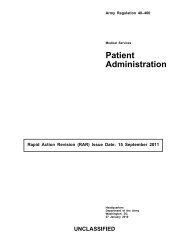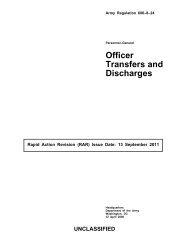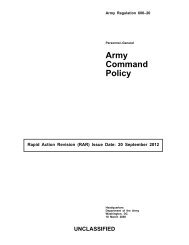Interception of Wire and Oral Communications for Law ... - U.S. Army
Interception of Wire and Oral Communications for Law ... - U.S. Army
Interception of Wire and Oral Communications for Law ... - U.S. Army
Create successful ePaper yourself
Turn your PDF publications into a flip-book with our unique Google optimized e-Paper software.
<strong>for</strong> which a court order has been obtained, advise the <strong>Army</strong> investigative or law en<strong>for</strong>cement <strong>of</strong>ficial in charge <strong>of</strong> the<br />
operation on the requirements <strong>of</strong> 18 USC 2510–20 <strong>and</strong> review the compliance with such requirements.<br />
Chapter 2<br />
Procedures Governing <strong>Interception</strong>s <strong>of</strong> <strong>Wire</strong> <strong>and</strong> <strong>Oral</strong> <strong>Communications</strong><br />
2–1. Nonconsensual interception in the United States<br />
When an interception is deemed necessary <strong>for</strong> a criminal investigation, the following procedures are applicable:<br />
a. The requesting major <strong>Army</strong> comm<strong>and</strong> (MACOM), shall prepare <strong>and</strong> <strong>for</strong>ward a “Request <strong>for</strong> Authorization” to<br />
HQDA(DAPE–HRE). Requests <strong>for</strong> interceptions related to criminal acts <strong>of</strong> espionage, sabotage or treason will be sent<br />
to HQDA(DAMI–CI). Requests from the CG, USACIDC may be sent directly to the <strong>Army</strong> General Counsel with an<br />
in<strong>for</strong>mation copy <strong>of</strong> the request provided HQDA(DAPE–HRE). This application shall be transmitted by expeditious<br />
means <strong>and</strong> protected to preclude unauthorized access or any danger to the <strong>of</strong>ficials or other persons cooperating in the<br />
case. Each Request <strong>for</strong> Authorization will contain the following in<strong>for</strong>mation:<br />
(1) The identity <strong>of</strong> the MACOM investigative or law en<strong>for</strong>cement <strong>of</strong>ficial making the application.<br />
(2) A complete description <strong>of</strong> the facts <strong>and</strong> circumstances relied upon by the applicant to justify the intended<br />
interception, including:<br />
(a) The particular <strong>of</strong>fense that has been, is being, or is about to be committed.<br />
(b) A description <strong>of</strong> the type <strong>of</strong> communication sought to be intercepted with a statement <strong>of</strong> the relevance <strong>of</strong> that<br />
communication to the investigation.<br />
(c) A particular description <strong>of</strong> the nature <strong>and</strong> location <strong>of</strong> the facilities from which or the place where the communication<br />
is to be intercepted.<br />
(d) The identity <strong>of</strong> the person, if known, committing the <strong>of</strong>fense <strong>and</strong> whose communications are to be intercepted.<br />
(3) A statement as to whether other investigative procedures have been tried <strong>and</strong> failed or why they reasonably<br />
appear to be unlikely to succeed if tried or to be too dangerous.<br />
(4) An identification <strong>of</strong> the type <strong>of</strong> equipment to be used to make the interception.<br />
(5) A statement <strong>of</strong> the period <strong>of</strong> time <strong>for</strong> which the interception is required to be maintained. If the nature <strong>of</strong> the<br />
investigation is such that the interception will not terminate automatically when the described type <strong>of</strong> communication<br />
has been first obtained, a description <strong>of</strong> the facts establishing probable cause to believe that additional communications<br />
<strong>of</strong> the same type will occur thereafter.<br />
(6) The procedures to minimize the acquisition, retention, <strong>and</strong> dissemination <strong>of</strong> in<strong>for</strong>mation unrelated to the purpose<br />
<strong>of</strong> the interception.<br />
(7) A complete statement <strong>of</strong> the facts concerning each previous application <strong>for</strong> approval <strong>of</strong> interceptions <strong>of</strong> wire or<br />
oral communications known to the applicant <strong>and</strong> involving any <strong>of</strong> the same persons, facilities or places specified in the<br />
application <strong>and</strong> the action taken thereon.<br />
(8) When the application is <strong>for</strong> an extension <strong>of</strong> an order, a statement setting <strong>for</strong>th the results thus far obtained from<br />
the interception, or an explanation <strong>of</strong> the failure to obtain such results.<br />
b. Except <strong>for</strong> those requests submitted directly to the <strong>Army</strong> General Counsel from the CG, USACIDC; the<br />
ODCSPER or ACSI, HQDA, as appropriate, will receive <strong>and</strong> process requests to the <strong>Army</strong> General Counsel who will<br />
review all requests prior to <strong>for</strong>warding them to the ASD(C). An in<strong>for</strong>mation copy <strong>of</strong> all Request <strong>for</strong> Authorization, sent<br />
to the <strong>Army</strong> General Counsel, will be provided OTJAG (DAJA–CL). The <strong>Army</strong> General Counsel will ensure<br />
compliance with the requirements <strong>of</strong> paragraph 1–4d, this regulation, <strong>and</strong> all applicable laws. Approval or disapproval<br />
<strong>of</strong> all Requests <strong>for</strong> Authorization wil be made in writing by the DOD General Counsel, or a single designee, based on<br />
the st<strong>and</strong>ards set <strong>for</strong>th in paragraph 1–4d, this regulation, <strong>and</strong> all applicable laws. An in<strong>for</strong>mation copy <strong>of</strong> the written<br />
approval or disapproval will be provided OTJAG (DAJA–CL).<br />
c. If the request is approved by the DOD General Counsel, the <strong>of</strong>ficial making the request or a designated<br />
representative will coordinate directly with an attorney from the Department <strong>of</strong> Justice or from a U.S. Attorney’s <strong>of</strong>fice<br />
<strong>for</strong> preparation <strong>of</strong> documents necessary to obtain a court order in accordance with 18 U.S.C. 2518. These documents<br />
will be <strong>for</strong>warded by the Department <strong>of</strong> Justice (DOJ) attorney to the Attorney General, or to the designated Assistant<br />
Attorney General, <strong>for</strong> approval in accordance with 18 U.S.C. 2516. Initial contact with the attorney from DOJ or from<br />
the U.S. Attorney’s <strong>of</strong>fice may be made while the request is being processed to the DOD General Counsel. In<br />
appropriate cases, the <strong>Army</strong> General Counsel may alert the Attorney General, or the designated Assistant Attorney<br />
General, or <strong>for</strong>thcoming interception requests while such requests are being processed.<br />
d. Upon approval by the Attorney General, or the designated Assistant Attorney General, <strong>for</strong>mal application <strong>for</strong> a<br />
court order will be made by the appropriate attorney from the Department <strong>of</strong> Justice, assisted, if required, by an<br />
appropriate military lawyer.<br />
e. Upon receipt <strong>of</strong> a court order <strong>and</strong> initiation <strong>of</strong> the interception operation in accordance with the term <strong>of</strong> the court<br />
o r d e r , t h e M A C O M i n v e s t i g a t i v e o r l a w e n f o r c e m e n t o f f i c i a l i n c h a r g e o f t h e o p e r a t i o n s h a l l c o n s u l t w i t h<br />
4 AR 190–53 3 November 1986
















